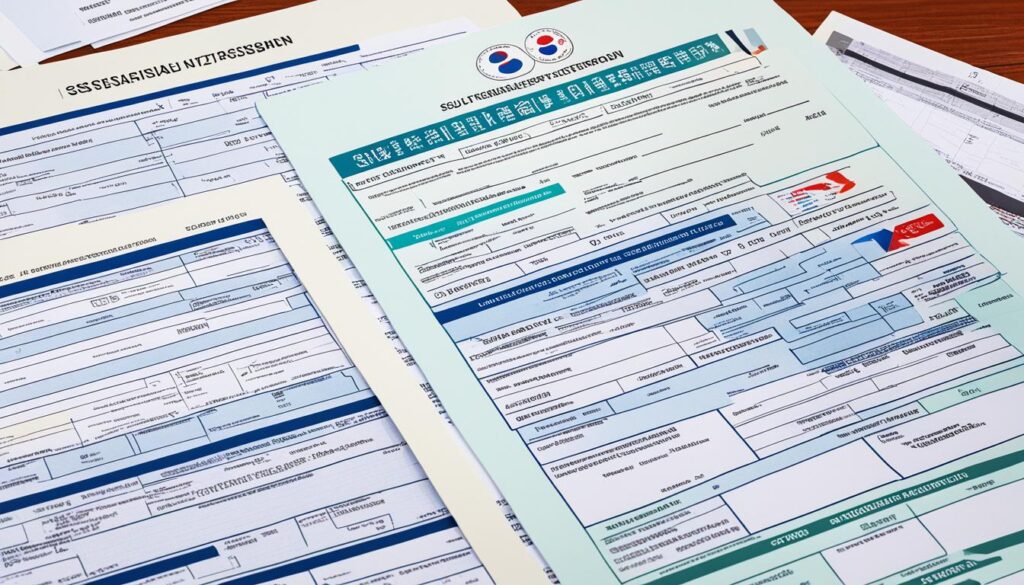As South Korea continues to develop and modernize, the desire for foreigners to acquire South Korean citizenship has grown significantly. The country boasts a thriving economy and a high standard of living, making it an attractive destination. With the number of expats living in South Korea ballooning from a few hundred thousand to nearly two million over the past fifteen years, it is evident that many see the benefits of integrating into South Korean society1. This guide aims to provide comprehensive information on the requirements, processes, and pathways for obtaining citizenship in South Korea. From understanding the South Korean naturalization process to knowing the eligibility criteria, this guide serves as a valuable resource for prospective citizens.
Key Takeaways
- South Korea has become increasingly appealing for foreigners seeking citizenship.
- Understanding the naturalization process is crucial for potential residents.
- Expats in South Korea have significantly increased in recent years.
- Investment and residency are common pathways to citizenship.
- Dual citizenship is generally not allowed in South Korea except in unique circumstances.
Understanding the Appeal of South Korea Citizenship
The growing interest in acquiring South Korea citizenship is primarily fueled by the country’s remarkable economic growth and stability. Over the years, South Korea has transitioned into one of Asia’s wealthiest nations, boasting a GDP that outstripped Australia, the Netherlands, and India in 19942. The nation has successfully established itself as a global hub for innovation and technology, making it a prime destination for expatriates seeking better job opportunities. Additionally, the efforts initiated under President Lee Myung-bak’s Global Korea initiative led South Korea to host significant international events such as the 2010 G20 Summit and the 2012 Nuclear Security Summit2.
Economic Growth and Stability
Many individuals pursuing the South Korean naturalization process are attracted to the country’s impressive economic performance. With a focus on green growth and sustainable development, South Korea has built a reputation for fostering a business-friendly environment, further enhancing South Korea citizenship benefits2. The nation’s strategic emphasis has resulted in its recognition as a global pivotal state, mentioning the importance of liberal values and global public goods in the 2023 National Security Strategy2.
Quality of Life in South Korea
Daily life in South Korea offers a unique blend of modern comforts and rich cultural experiences. The country boasts a reasonable cost of living, excellent healthcare, and a strong educational system, making it an appealing choice for those looking to establish roots. Additionally, the sense of community and cultural vibrancy adds to the overall quality of life, drawing increased attention from potential immigrants3. Many expatriates appreciate the diverse social landscape, and this influx of interest in South Korea citizenship correlates with rising opportunities in various sectors, such as technology and entertainment. For instance, K-pop groups like BTS and Blackpink have achieved unprecedented global success, showcasing the cultural dynamism of South Korea4.
Overview of the South Korean Naturalization Process

The South Korean naturalization process serves as a structured pathway for foreigners seeking to obtain citizenship in South Korea. Through naturalization, individuals can become citizens after fulfilling specific residency and legal requirements. Understanding these requirements is crucial for those interested in how to become a citizen of South Korea.
What is Naturalization?
Naturalization refers to the legal process whereby a foreign national attains citizenship in a new country after complying with particular regulations. For South Korea, this involves meeting several eligibility criteria, such as residency periods, personal conduct, and knowledge of the language and culture. A foreign individual must demonstrate their commitment by residing in the country for a mandatory period, commonly five consecutive years for general naturalization5.
Different Paths to Citizenship
There are various avenues through which one can achieve South Korean citizenship. Foreigners can apply for general naturalization, which typically requires the aforementioned five years of residence. Additionally, individuals may qualify for simple naturalization after three consecutive years of living in South Korea5. Those with extraordinary talents or who have made significant contributions to South Korean society might qualify for special naturalization5. Other means include obtaining citizenship through family ties or marriage to a South Korean national, which significantly eases the pathway towards citizenship. It is worth noting that individuals who gain South Korean citizenship generally need to relinquish any other foreign nationalities they possess within a specified timeframe5.
South Korea Citizenship Requirements

Understanding the South Korea citizenship requirements is crucial for individuals seeking to navigate the South Korean naturalization process. In general, applicants must meet specific criteria detailing their eligibility before pursuing citizenship. Below are the primary aspects of these requirements.
General Eligibility Criteria
To qualify for South Korean citizenship, individuals must be at least 20 years old and hold a valid Alien Registration Card. A registered address in Korea is mandatory, alongside proof of good conduct, which includes having no criminal record. Foreigners with a Korean parent can attain South Korean nationality at birth, regardless of their parents’ nationality, ensuring that 100% of individuals in such situations are eligible for citizenship at the time of birth5. For naturalization through marriage, residency in South Korea for a minimum of two years is required6.
Language and Cultural Knowledge
Applicants must demonstrate a foundational understanding of the Korean language, culture, and customs. This requirement includes passing a language proficiency exam and a written test that assesses knowledge of Korea’s historical and societal contexts. The emphasis on cultural awareness is part of the broader South Korean naturalization process that focuses on integration into Korean society. Thus, those preparing for citizenship should engage with both the language and the rich customs of the country to enhance their prospects7.
How to Acquire South Korean Citizenship Through Residency

Acquiring South Korean citizenship via residency is a significant opportunity for many foreign nationals who wish to settle in this vibrant country. The general naturalization process involves various steps, starting with submitting an application that requires comprehensive documentation. Specifically, individuals need to prove financial stability and provide valid identification. To qualify, applicants must reside in South Korea for at least five consecutive years, ensuring they spend no less than 183 days in the country each year.
General Naturalization Process
The path to acquire South Korean citizenship through residency demands careful preparation. Applicants must gather necessary documents that support their residency status and personal situation. This includes proof of language proficiency and knowledge of Korean culture, which are essential for evaluating an applicant’s integration into society. Factors such as employment status, family situation, and past immigration history can significantly influence the final decision regarding naturalization.
Criteria for Residency-Based Naturalization
Understanding the criteria for South Korea residency for citizenship helps streamline the application process. Certain categories of foreign nationals are eligible for permanent residency, including:
- Individuals who have married a South Korean citizen.
- Foreign nationals living in South Korea as workers for five years or more.
- Investment visa holders who meet specific criteria.
- Those maintaining a child born out of wedlock to a Korean national.
For example, foreign nationals married to a Korean citizen for at least two years, along with other requirements, can apply for permanent residency. This highlights the importance of having clear documentation, such as marriage certificates and proof of language skills. Notably, South Korea allows no dual citizenship; thus, naturalized citizens must renounce their original nationality while enjoying the benefits of access to the strong South Korean passport and a rich quality of life in the country8.
As the foreign population in South Korea continues to rise, understanding the pathways to naturalization becomes increasingly vital. In 2023, there was a record of 923,000 employed foreign residents, showcasing the growing diversity and opportunity in the labor market. Also, 34,000 individuals successfully acquired South Korean citizenship, indicating a thriving interest in permanent residency among expatriates9.
Citizenship in South Korea Through Family Relations
Obtaining South Korean citizenship via familial ties provides an accessible path for individuals with Korean ancestry. Those who can trace their heritage to a parent or grandparent who is a South Korean citizen may qualify to apply for citizenship. Additionally, those born in South Korea hold a distinct advantage, furthering their claim to citizenship by investment in South Korea. The process of reinstating Korean nationality involves several necessary steps, including the submission of documents such as family relationship notifications, personal statements, and a criminal background check, among others10.
Eligibility for Individuals with Korean Ancestry
Notably, any individual with direct lineage to Korean citizens can access the streamlined naturalization process. Documenting one’s ancestry not only emphasizes the importance of family connections but also highlights the significance of South Korea citizenship benefits. Those who have a strong heritage connection can experience a sense of belonging and a deeper cultural understanding.
Marriage to a South Korean Citizen
Foreigners married to South Korean citizens can benefit from an expedited citizenship application process. To qualify, the couple must maintain their marriage for at least two years while meeting other criteria. Such personal ties not only reflect commitment but also pave the way for enjoying various benefits associated with South Korean citizenship. It is crucial, however, for dual citizens to reckon with their obligations in South Korea, including military service for males11 while considering the implications of maintaining dual status10.
FAQ
What are the main benefits of acquiring South Korean citizenship?
What is the minimum residency requirement to apply for South Korean citizenship?
Can I apply for South Korean citizenship if I have South Korean parents?
Is dual citizenship allowed in South Korea?
What are the language requirements for naturalization?
Can I expedite my citizenship application through marriage?
What documents are required for the naturalization application process?
Are there alternatives to naturalization for gaining South Korean citizenship?
Source Links
- https://nomadcapitalist.com/global-citizen/get-south-korea-residency-passport/
- https://www.brookings.edu/articles/south-korea-as-a-global-pivotal-state/
- https://english.seoul.go.kr/policy/international-exchange/honorary-citizenship/
- https://www.airuniversity.af.edu/JIPA/Display/Article/3212634/the-growth-of-south-korean-soft-power-and-its-geopolitical-implications/
- https://elaw.klri.re.kr/eng_mobile/viewer.do?hseq=18840&type=part&key=7
- https://www.familysearch.org/en/wiki/South_Korea_Naturalization_and_Citizenship
- https://en.wikipedia.org/wiki/Citizenship_of_South_Korea
- https://www.geumcheon.go.kr/eng/contents.do?key=2421
- https://companyformationkorea.com/citizenship-in-korea/
- https://goal.or.kr/dual-citizenship/
- https://lawfirmleeandlee.com/multiple-citizenship-in-korea/

Comments